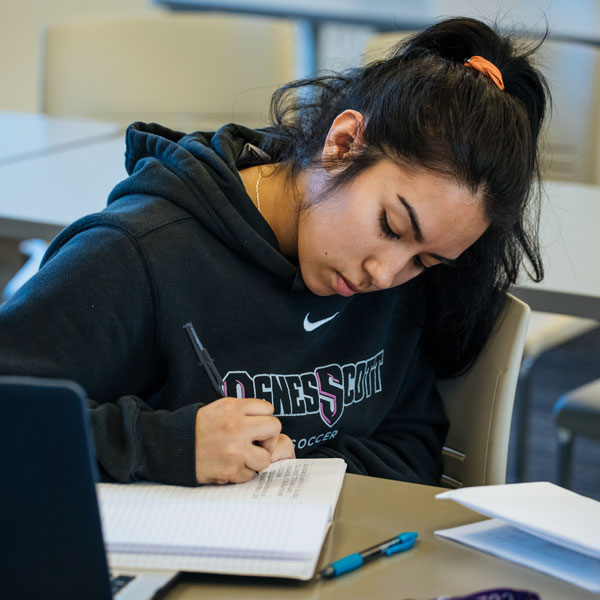This website uses cookies. Find out more in our Privacy Policy.
The English department believes that the study of literature, language, and writing elevates our minds, enlarges our capacity to understand and communicate, and integrates liberal learning. Our curriculum includes courses in British, Irish, American, and postcolonial literatures; film, the history and structure of the language; and creative writing.
Good readers make good writers, creative thinkers, and responsible citizens. Students in the English Department participate in incisive, well-researched, and thoughtful study of literature as well as reflective, innovative, and skillful development of critical and creative writing. Our courses are characterized by frequent discussion, prioritize original analysis, and emphasize independent research.
The English literature major exposes students to a variety of ways of reading, understanding, and writing about literature. Our courses are characterized by frequent discussion and emphasize original analysis and independent research. The requirements for the major ensure that each student will have a grounding in literary history, as well as many opportunities to choose courses that reflect and develop their own particular interests. interests. Students majoring in English Literature choose from an array of courses organized into three central domains:
Students majoring in English Literature take courses emphasizing both breadth and depth of knowledge and addressing a variety of literary periods, genres, and creative approaches. In addition, students hone their skills in literary and cultural analysis, performing original research, and writing for a variety of purposes and audiences. You'll learn to:
The Center for Writing and Speaking (CWS) is a peer tutoring organization devoted to improving and enhancing students’ writing and speaking skills. Staffed by trained peer tutors, the CWS provides students of all ability levels with individual assistance in writing papers and in preparing and practicing speeches and presentations.
Thanks to generous donors, the English department is able to bestow several awards and scholarships yearly for excellence in both academic writing and creative writing. The department also offers a variety of on and off campus internship opportunities through the Center for Writing and Speaking, the Writers' Festival, the Decatur Book Festival, and more!
Between the annual Writers' Festival, the Kirk Writers-in-Residence, and the Writers & Scholars Series, the English department brings multiple noted creative writers and literary scholars to come to campus to give readings and lectures for the campus community and to work closely with Agnes Scott students. In addition to bringing in a wide range of national and international guests, the department also showcases the best of Atlanta's brilliant literary and scholarly communities.
Thinking critically and creatively, being able to read carefully and write thoughtfully, and having the necessary skills to analyze, communicate, and express ideas effectively will translate to any field.
With a degree in English Literature, you can do almost anything! You may want to start your first podcast or open a bookstore, or you may want to explore a diverse range of professional areas, including editing, production, administration, marketing, content creation, social media management, communications, or public relations. While some majors enter the workforce just after graduation, others continue their academic work by pursuing graduate degrees in creative writing, literature, the law, or library and information sciences. You may even consider continuing your coursework at Agnes Scott through our Agnes Accelerated 4+1 Program!